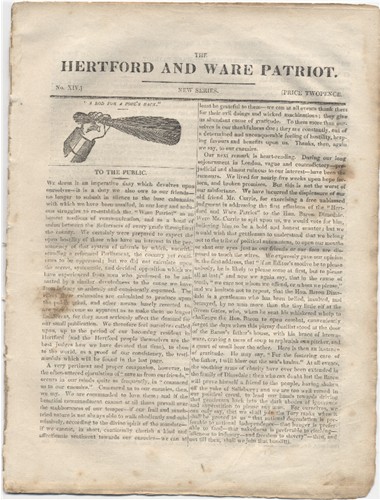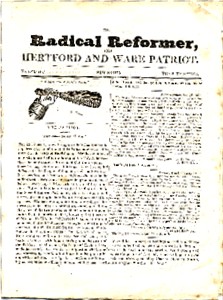|
|
The Hertford and Ware Patriot 1833-5 |
|
|
|
The Hertford and Ware Patriot 1833-5 |
|

This was a radical newspaper which was published in Hertford, unlike many of its contemporaries, which were published in London. Much of its content is highly political but each issue contains a small amount of local news. In 1834 it became "The Radical Reformer and Hertford and Ware Patriot".
Some extracts of local news from this paper will be included in the Old News section of this web site. Already posted are:
Hertford Justice June 1834
The Ware Steeple Chase February 1835
Edited. Printed, and Published by JOHN THACKER SAXTON, Poet's Corner, Dimsdale's Buildings, Hertford; and sold by Mr Watling, Newsman, 409, Strand, and by Mr Cleave, Shoe-lane, three doors from Fleet Street, London; Charles Terry shoemaker, St Andrew-street, Hertford; and by all Booksellers and Newsmen in the respective Towns and Villages in the County of Hertford.
 It
is available in the British Library
Newspaper Collection and there is an online guide to the literature on The
Radical and Dissenting Press in the 19th Century, on the Nottingham
Trent University Learning and
Resources Web Site [http://www.ntu.ac.uk/llr/index.htm].
It
is available in the British Library
Newspaper Collection and there is an online guide to the literature on The
Radical and Dissenting Press in the 19th Century, on the Nottingham
Trent University Learning and
Resources Web Site [http://www.ntu.ac.uk/llr/index.htm].
==================
Lesley Phillips (phillipslesley @t yahoo.co.uk) is researching the life of John Thacker Saxton, and has kindly supplied the following short biography.
John Thacker Saxton: a Chesterfield Radical
John Thacker Saxton was born about 1777, the son of John and Sarah Saxton of Chesterfield. He lived at a time when there was a strong movement for parliamentary reform and the repeal of the Corn Laws. The Corn Laws passed by parliament kept the price of corn artificially high. This protected the profits of the landowners, who also controlled parliament, but the high price of bread and shortages following poor harvests led to much suffering and rioting in some parts of the country, and workers also began to demand higher wages. Many of the supporters of the radical movement were weavers, framework knitters and hosiers. John Thacker Saxton, the son of a hosier, was a publisher and bookseller, and may have worked in both occupations. Times were hard for both father and son, both going bankrupt. The London Gazette of 28th May 1804 records the bankruptcy of J.T. Saxton, printer; to surrender June 4, 5, July 7, at the Angel Inn, Chesterfield. Attorney Mr. Thomas, Chesterfield.
John Saxton, his father, was a hosier of Chesterfield who, by 1803, worked in partnership with George Chapman. The firm failed, and George Chapman deserted his wife, leaving the citizens of Chesterfield to raise money to buy an annuity for his abandoned wife Elizabeth, who had two children to support, one only a few weeks old. On the 24th April 1824 J. Saxton, hosier of Chesterfield, was granted his certificate (discharge from bankruptcy). It seems that John Saxton had remained in Chesterfield, but his son had moved away from the town.
One of the most famous radicals of the time was a gifted speaker named Henry Hunt (1773-1835), who was nicknamed the 'orator'. Hunt believed passionately in the radical cause, and spoke of reform to huge crowds in some of England's cities. He also campaigned for shorter working hours and an end to child labour. Hunt's supporters included a group of men in Manchester who started a weekly newspaper called the Manchester Observer in January 1818. One of the writers for this paper was John Thacker Saxton. The editor of the Observer, James Wroe, formed the Patriotic Union Society with other radicals in Manchester, and they invited Hunt to speak at a meeting on the 16th August 1819 at St Peter's Field. The size of the crowd alarmed the local magistrates, and their attempts to arrest Hunt and others, and to disperse the crowd resulted in the tragedy of the Peterloo Massacre. Eleven were killed and some 400 people were injured.
On the 19th August The Times reported; 'A person of the name of Saxton, who is, we believe, the editor of the Manchester Observer, was standing in the cart. Two privates rode up to him. "There" said one of them, "is that villain, Saxton; do you run him through the body." "No," replied the other, "I had rather not - I leave it to you." The man immediately made a lunge at Saxton, and it was only by slipping aside that the blow missed his life. As it was, it cut his coat and waistcoat, but fortunately did him no other injury.
At Lancashire Assizes in September 1819 (reported in The Times 8th September), John Thacker Saxton, aged 42 was charged with others; 'That they… being persons of a wicked and turbulent disposition, did, at Manchester, in the said county, on the 16th of August inst., combine, conspire, confederate and agree together, to excite tumult and insurrection within this realm, and by force and violence to alter the government and constitution thereof as by law established.'
J.T. Saxton wrote a letter to The Times, published 25th November 1819. He wrote defiantly; 'I beg leave to conclude with reminding you, and all the friends of liberty and justice, that our cause grows and gathers strength with the plunderings of our enemies; whilst their rapacity must not only destroy the means of their own existence, but must, ere long, turn them to the destruction of each other.'
In 1820 Henry Hunt and his fellow radicals were tried at York, and Hunt was imprisoned for two and a half years. Saxton and three others were found not guilty of exciting discontent, and were allowed free. John Thacker Saxton finally appears in Hertford, still campaigning for parliamentary reform. Between 1833 and 1835 he published a paper called the Hertford and Ware Patriot, later The Radical Reformer and Hertford and Ware Patriot'. A radical until the day he died, John Thacker Saxton was buried in Hertford in April 1835.
L. Phillips. With thanks to B. Austin and J. Maguire
==================
If you can add to the information given above tell me.
Page updated April 2006